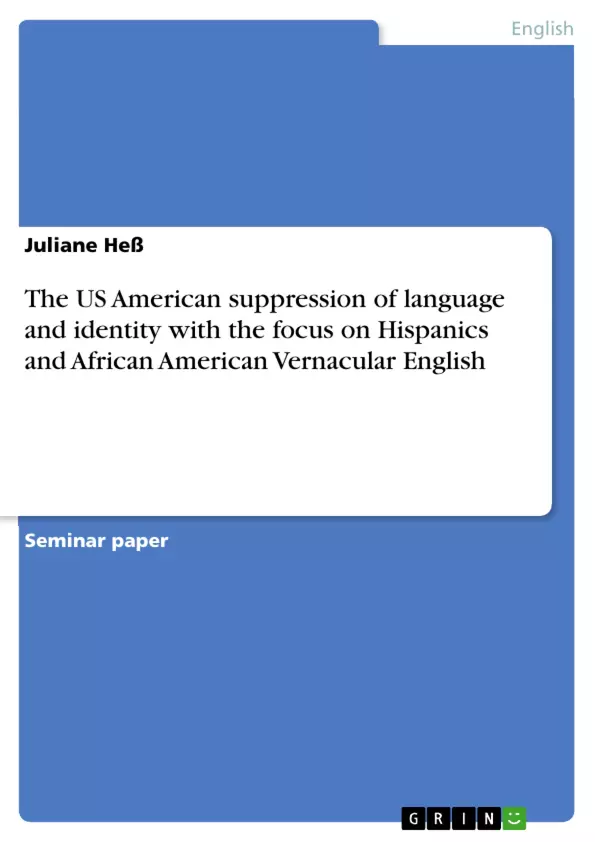According to the Oxford English Dictionary language is a system of communication in speech and writing that is used by people of a particular country and identities are the characteristics, feelings or beliefs that distinguish people from others. Both terms are directly connected because humans use speech as a tool to express their identity. It is the mother tongue which signals the origin of a person but the way people talk on the lexical-, grammatical- or phonological level gives a listener an idea of a speaker´s sex, social class, religion, educational level, attitude, mood etc.. A strong impact on the personal identity has the social environment and the culture because people stick to norms, standards, beliefs and values which are prescribed by society. On the one hand we are aware of ourselves and we know who we are but on the other hand the perception of other people who identify us is important and that is different from person to person...
Inhaltsverzeichnis (Table of Contents)
- Introduction
- The multicultural United States of America
- The suppression of Spanish and the Hispanic identity
- Speaking English with a Spanish accent
- The undesirable African American Vernacular English
- Conclusion
- References
Zielsetzung und Themenschwerpunkte (Objectives and Key Themes)
This text examines the suppression of languages and identities in the United States, focusing on the experiences of Hispanics and African Americans. The author explores the historical and social contexts that contribute to these dynamics, delving into the role of language as a marker of identity and the challenges faced by individuals navigating diverse linguistic landscapes.- The role of language in shaping and expressing identity
- The impact of language suppression on individual and cultural development
- The complexities of multilingualism and its perceived threat to national identity
- The influence of social and political forces on language policies and practices
- The experiences of Hispanic and African American communities in relation to language and identity
Zusammenfassung der Kapitel (Chapter Summaries)
- Introduction: The chapter introduces the concepts of language and identity, emphasizing their interconnectedness and the role of language in expressing individual and group affiliation. The author highlights the dynamic nature of language and identity and the potential for societal pressure to influence language use and identity formation.
- The multicultural United States of America: This chapter examines the diverse linguistic landscape of the United States, acknowledging the existence of multiple languages and varieties of English alongside the dominant Standard American English (SAE). The concept of majority and minority groups is introduced, with a focus on the significant Hispanic population and their use of Spanish.
- The suppression of Spanish and the Hispanic identity: This chapter delves into the historical and contemporary efforts to suppress Spanish in the United States. The author discusses the English Only Movement and its influence on language policies, highlighting the potential impact on Hispanic identity and cultural heritage.
- Speaking English with a Spanish accent: This section explores the challenges faced by Hispanics in the United States who speak English with a Spanish accent. The author examines the social stigma associated with non-standard accents and the potential for prejudice and discrimination in educational and professional settings.
Schlüsselwörter (Keywords)
This text focuses on the complex interplay of language and identity, particularly within the context of the United States. Key themes include language suppression, multilingualism, national identity, social and political forces, Hispanic identity, African American Vernacular English, and linguistic discrimination. The text also delves into the role of language in shaping individual and group affiliation, the impact of social norms on language use, and the challenges faced by individuals navigating diverse linguistic landscapes.Frequently Asked Questions
How are language and identity connected?
Language is a tool to express identity; a person's mother tongue and dialect provide clues about their origin, social class, education, and cultural values.
What is the "English Only Movement"?
It is a political movement in the US that advocates for English to be the only official language, often leading to the suppression of Spanish and other minority languages.
What challenges do Hispanics face regarding their accent?
Speaking English with a Spanish accent often carries a social stigma, which can lead to prejudice and discrimination in professional and educational environments.
What is African American Vernacular English (AAVE)?
AAVE is a distinct variety of English spoken by many African Americans, which has its own grammatical and phonological rules but is often unfairly viewed as "undesirable" or incorrect by dominant society.
Why is language suppression harmful?
Suppressing a language can hinder personal and cultural development, as it forces individuals to distance themselves from their heritage to fit societal norms.
- Citation du texte
- Juliane Heß (Auteur), 2007, The US American suppression of language and identity with the focus on Hispanics and African American Vernacular English, Munich, GRIN Verlag, https://www.grin.com/document/177588



